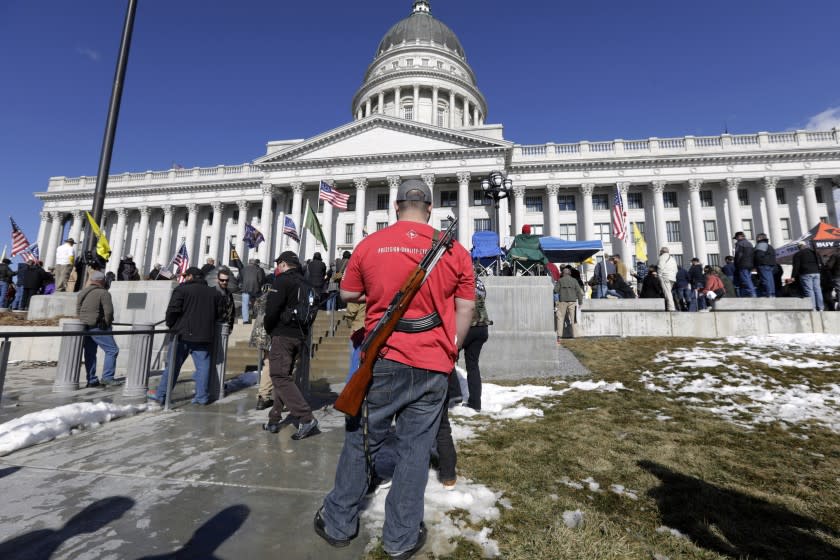Amid gun control debate, federal court rules states may restrict open carry of weapons

As the nation debates gun control following two mass shootings in Colorado and Georgia, a California-based federal appeals court decided Wednesday that states may restrict the open carrying of guns without running afoul of the 2nd Amendment.
In a 7-4 decision, an en banc panel of the U.S. 9th Circuit Court of Appeals upheld a county law in Hawaii that has severely limited permits for open carrying of guns.
"The government may regulate, and even prohibit, in public places — including government buildings, churches, schools, and markets — the open carrying of small arms capable of being concealed, whether they are carried concealed or openly," Judge Jay Bybee, appointed by President George W. Bush, wrote for the majority.
The decision is likely to help push the Supreme Court to review the issue. Federal appellate courts have handed down conflicting rulings on gun laws that only the high court can resolve.
The Hawaii decision came as President Biden is calling for stricter laws in the wake of two shootings that have killed at least 18 people. States run by Democrats have generally pushed for stronger gun laws, but Republican-dominated Legislatures in many states are trying to weaken them. Fifteen states already allow people to carry concealed guns without a permit, and nine have bills to either allow or expand the practice.
Bybee, writing for the 9th Circuit, said a review of more than 700 years of American and English law showed that government has long had the power to regulate arms in public places.
"We have never assumed that individuals have an unfettered right to carry weapons in public spaces," Bybee wrote. "Indeed, we can find no general right to carry arms into the public square for self-defense."
Bybee was joined by another Bush appointee and five Democratic appointees.
The decision allows the continued enforcement of a law on the big island of Hawaii that limits permits for openly carrying guns, other than for hunting, to persons with an urgent need for arms and “engaged in the protection of life and property.”
A man who sought and was denied a permit for open carry for self-protection challenged the law. Evidence during the legal proceedings revealed that the county's permits had been limited to security guards.
Wednesday's decision overturned a 2-1 ruling in the same case a year ago by a 9th Circuit panel.
Judge Diarmuid F. O’Scannlain, writing the lead dissent Wednesday, called the majority decision "unprecedented" and "extreme."
"At its core," wrote O'Scannlain, a Reagan appointee who was joined by other Republican appointees, "the 2nd Amendment protects the ordinary, law-abiding citizen’s right to carry a handgun openly for purposes of self-defense outside the home. Despite an exhaustive historical account, the majority has unearthed nothing to disturb this conclusion."
A gun control group praised Wednesday's ruling and noted that the Supreme Court would consider this week whether to review a similar case out of New York.
“Today’s ruling, joined by respected appellate judges across the ideological spectrum, is the latest reminder that arguments against reasonable, life-saving gun laws rarely hold up in the courtroom,” said Eric Tirschwell, managing director for Everytown Law, the litigation arm of Everytown for Gun Safety.
“As the court recognized, states and localities have extremely broad power to restrict the carrying of firearms in public spaces."
The 9th Circuit decided in 2016 that people do not have a constitutional right to carry concealed guns in public, allowing counties to set requirements for permits and decide who gets them.
Alan A. Beck, who represented the Hawaii gun owner, said he was barred from carrying a concealed weapon under the 2016 decision so he asked for a permit to carry a gun openly. Beck said he will ask the Supreme Court to review the Hawaii case.
The 9th Circuit has now decided that there is no constitutional right to carry a gun outside the home for self-protection, placing the court in direct conflict with other circuits and strengthening the chance the Supreme Court will step in and decide the issue, Beck said.
In California, only small towns can issue permits to openly carry guns and they rarely do so, he said. County sheriffs can issue permits for concealed guns upon a showing of "good cause" by the applicant, he said. In rural counties, such permits are often issued, but they are rarely approved in large cities, he said.
"It varies greatly from L.A. and San Francisco, where it is almost impossible to get, versus the rural counties," he said. "That is just based on the sheriffs' policies."
Wednesday's decision affects nine Western states, including California, that make up the 9th Circuit.
This story originally appeared in Los Angeles Times.

